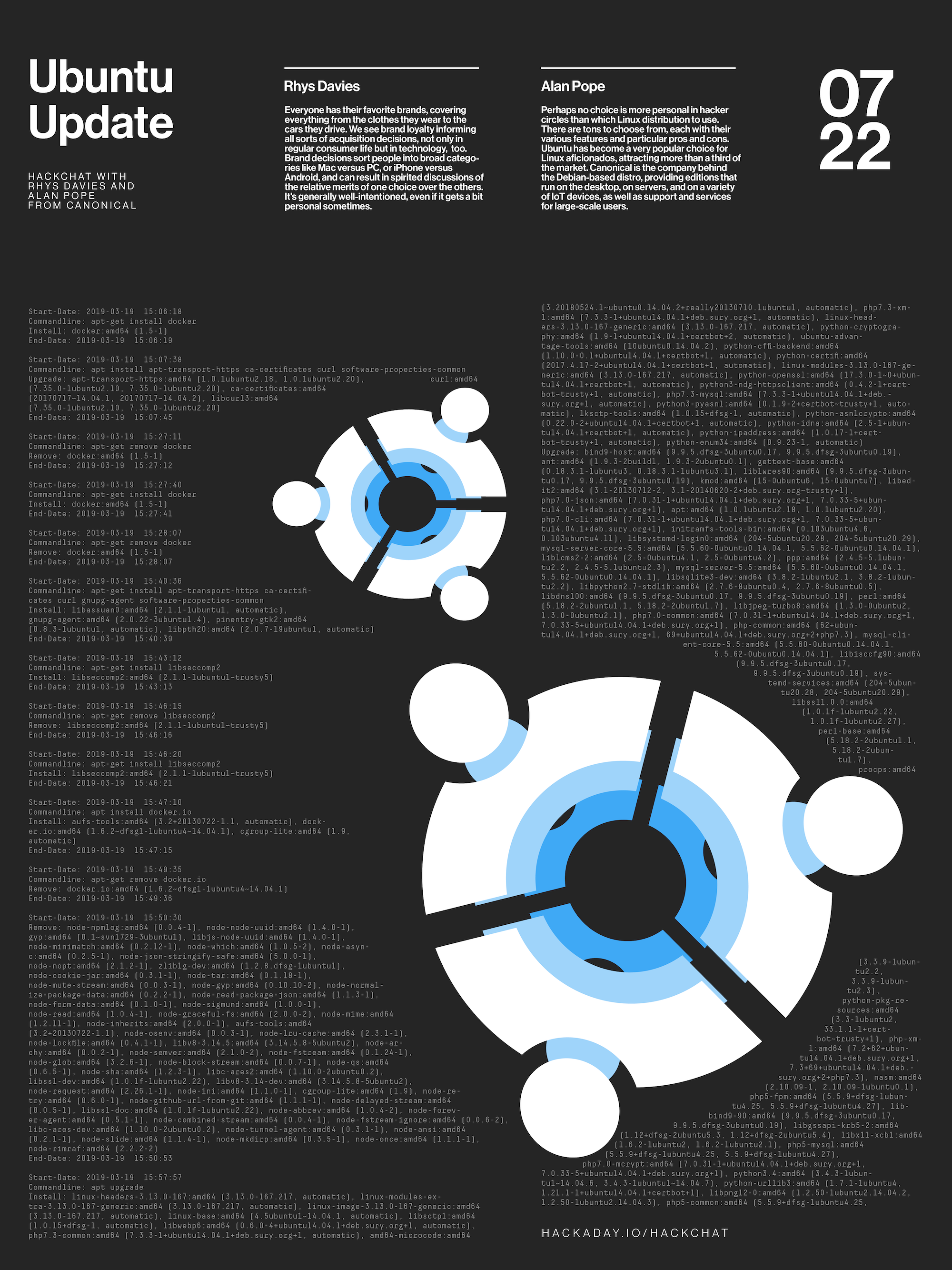Join us on Wednesday, July 22 at noon Pacific for the Ubuntu Update Hack Chat with Rhys Davies and Alan Pope!
Everyone has their favorite brands, covering everything from the clothes they wear to the cars they drive. We see brand loyalty informing all sorts of acquisition decisions, not only in regular consumer life but in technology, too. Brand decisions sort people into broad categories like Mac versus PC, or iPhone versus Android, and can result in spirited discussions of the relative merits of one choice over the others. It’s generally well-intentioned, even if it gets a bit personal sometimes.
Perhaps no choice is more personal in hacker circles than which Linux distribution to use. There are tons to choose from, each with their various features and particular pros and cons. Ubuntu has become a very popular choice for Linux aficionados, attracting more than a third of the market. Canonical is the company behind the Debian-based distro, providing editions that run on the desktop, on servers, and on a variety of IoT devices, as well as support and services for large-scale users.
To fill us in on what’s new in the world of Ubuntu, Canonical product manager Rhys Davies and developer advocate Alan Pope will stop by the Hack Chat this week. They’ll be ready to answer all your questions about the interesting stuff that’s going on with Ubuntu, including the recently announced Ubuntu Appliances, easy to install, low maintenance images for Raspberry Pis and PCs that are built for security and simplicity. We’ll also talk about snaps, desktops, and whatever else crops up.
 Our Hack Chats are live community events in the Hackaday.io Hack Chat group messaging. This week we’ll be sitting down on Wednesday, July 22 at 12:00 PM Pacific time. If time zones have you down, we have a handy time zone converter.
Our Hack Chats are live community events in the Hackaday.io Hack Chat group messaging. This week we’ll be sitting down on Wednesday, July 22 at 12:00 PM Pacific time. If time zones have you down, we have a handy time zone converter.
Click that speech bubble to the right, and you’ll be taken directly to the Hack Chat group on Hackaday.io. You don’t have to wait until Wednesday; join whenever you want and you can see what the community is talking about.

















As long as they are not going to mess with /home like it mentioned on HaD a few months back.
Most of the distros are basically called SystemD Linux as every package in them depend on it.
maybe they could call all the linux distributions “glibc linux”, as every package depends on it
maybe they could call all the linux distributions “”ELF linux” because they all run ELF binaries
maybe they can call it “computer linux” because every package in it requires a computer to run
Thinking about ubuntu has convinced me that projects cannot be truly free and open source if there are business models attached to it. Sure they have made linux accessible for a lot of (non-tech) people and they provided value for free; I’m not arguing that their business model is bad for people. It is still a business however and money needs to be made, which will place their financial interests at odds with the open source ideology from time to time. I would be interested to know how they navigate such matters. Furthermore I am wondering if snap is a symptom of this conflict.
Anyone any thoughts?
If Linux were only developed by those without day jobs, we’d still be waiting on 486 support.. Even Linus has gotten a steady paycheck from a variety of Linux oriented employers. Day jobs and pay checks require a revenue model.
Fortunately it’s a pretty symbiotic relationship.
Sure, I’m just remarking on the potential for conflict of interest between open source and business. There will be times that both interests do not line up. I’m interested in how ubuntu balances open source and business. How do they maintain that symbiotic relationship?
Ask them why they decided to make apt lie to you and install snap packages without telling you.
$THEY know what is right for $YOU!
If you know better, use a different brand.
+1
There is a lot to talk about with how they’re handling their software and how predatory their behaviour has been lately.
I’m running 18.04, and I noticed I have a bunch of snaps eating up my hard drive. I never realized it till I saw the HaD article. Now I’m considering dumping Ubuntu. They should probably backpedal a bit before they lose everyone. SSDs aren’t big enough that we can dump hundreds of megs into otherwise small apps.
My nephew complained last month about some of his Ubuntu issues. I just laughed in remembrance of his years of ridicule for my use of Slackware for all of his life.
I like the unified Ubuntu environment and not having to shoehorn in drivers for every platform (deploys stuff on amd64 and aarch64 without issues). Also not a huge fan of Snap mounts littering my listings, and prefer using the Debian apt package set whenever possible (often I donate directly to core project coffee funds that publish FOSS I found useful).
Gentoo is probably my next OS given after Ubuntu 16.04 LTS the quality is getting somewhat experimental with the new releases… post 18.04 LTS I would still classify as not stable for some use-cases years later.. YMMV depending on the release… and if the old MATE Desktop is supported. ;-)
I have mixed feelings about systemd and netplan already… given the number of IT hours it wasted on projects… so changing core concepts like how /home is treated sounds really risky.
The Idea of ZFS snapshotting the user /home and root / mounts has a lot of potential to make the OS more resilient (especially if ZFS file level encryption is officially supported), but we will need to look very closely at the license implications and RAM footprint trade-off.
All that being said, I have to admit it is often much easier to use Ubuntu for the rich library dependency support with third party applications and printer drivers. If the OS becomes annoying to deploy like Windows than we can guess what happens next… ;-)
Try Linux Mint MATE. Excellent support for hardware, easy to use, very stable.
Hear here! That mirrors my experience. I’m tending to run into baked in configuration issues in Ubuntu breaking things. Unfortunately they’re also frequently working as intended (as with the snaps) and just quietly breaking things.
I used to be a fan of Ubuntu for a long time. Not for me (it’s Debian), but i held the accessibility for “just users” in high esteem.
With snap (and the shenanigans of Apt sneaking snap in!) they jumped the shark. I won’t recommend Ubuntu anymore.
I’m on kubuntu 18.04 LTS on all my systems and am keeping an eye on the snap shenanigans very closely because come upgrade time, if the snap situation has not improved, I will be jumping ship. I don’t want to, but the snap issue will force the issue for me.
That said, I’m very grateful for the use of lots of very fine software I’ve had over the years. There’s no reason Canonical should care about my views, I’ve never given them a penny, except that my views seem to mirror those of many other people, no doubt some of them paying customers.
I’d love to know how they forsee dealing with issues of 4k screens becoming normal and fractional scaling issues going forward, only because seeing how they deal with it will show a way for other distros.
I only used Ubuntu since the beginning, and I’m still a simple user- but even I realized how they were falling when they insisted on integrating Amazon search (thank god that crap is gone) and especially lately with forcing snaps on people with no other option.
I am now learning to use Mint because of this, because even an idiot like me can see how much bloatware and cross dependency is formed by forcing snaps. Snaps can be a great thing when used for certain troublesome programs, but not EVERYTHING. I’d like to know what they intend to do about the backlash that drove even beginners like me from them. It sucks- because I actually liked Ubuntu.